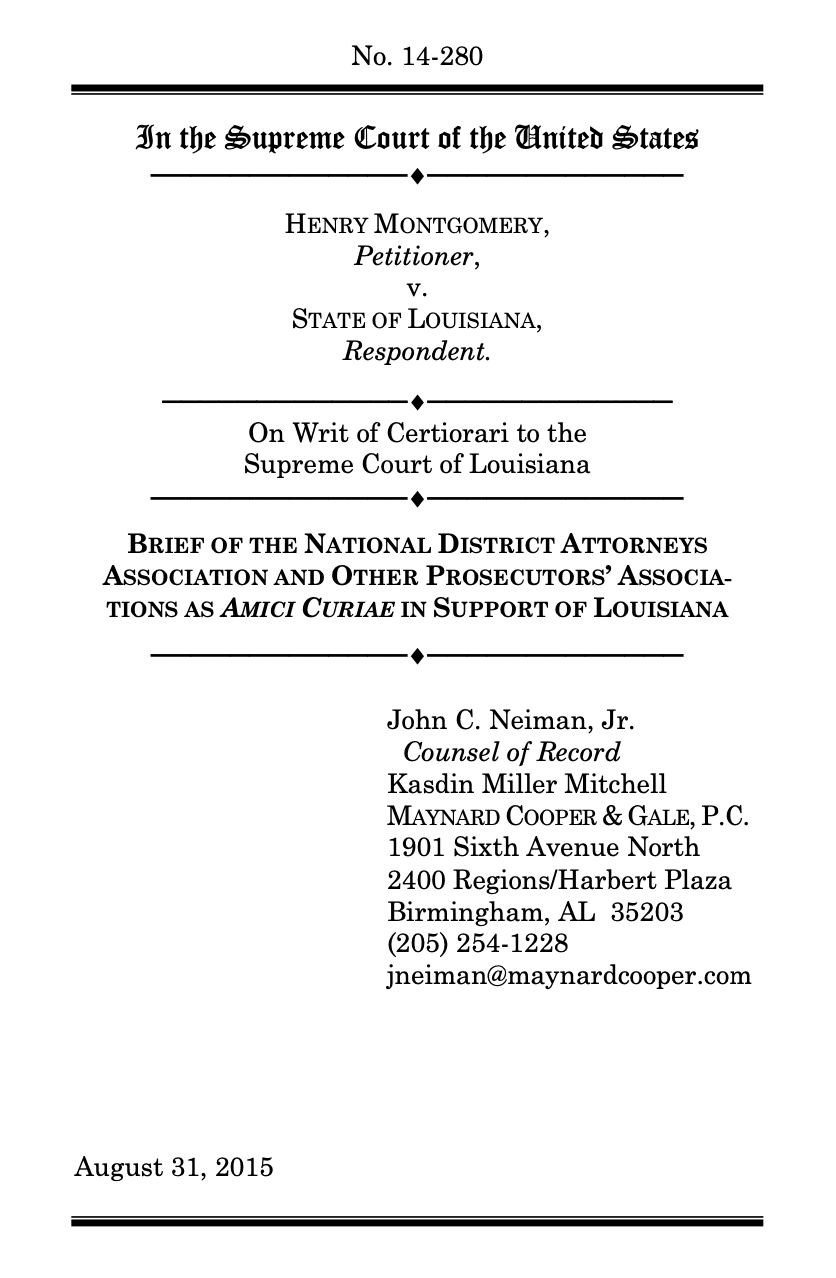
Summary of Argument
Prosecutors’ on-the-ground experience shows that Miller established a rule that is fundamentally distinct from any rule deemed to be “substantive” under Teague. For the changes in the law this Court previously has deemed substantive, few logistical difficulties have followed from their retroactive application. In those cases, postconviction courts simply have had to vacate certain convictions or reduce certain sentences to the maximum sentence authorized by law. Miller is different. It requires a fact-intensive hearing and a judgment call by the sentencing judge. Prosecutors have found that for prosecutions first commenced after this Court decided Miller, these hearings have worked well. That has not been true when courts have proceeded with Miller hearings in postconviction cases, years after the defendant was first tried. Contrary to the suggestions by the amici who support Montgomery, the postconviction hearings pose substantial difficulties to all parties, create significant risks of inaccurate results, and undermine finality in a way that is contrary to the values underlying this Court’s precedents.
The record at postconviction Miller hearings has been a particular problem. In new prosecutions, both sides have full incentives to develop the record relevant to sentencing, and both sides have the capacity to do so, given that the crime occurred relatively recently and the defendant is still young. But in postconviction proceedings, neither side may have had an incentive to develop that record, and it is difficult to assemble after the fact. Because many years often will have passed since the offender’s crime, the judge typically will be different from the judge who presided over the defendant’s trial, and thus unable to utilize trial experience to help make the appropriate sentencing determination. Offenders may have an incentive to manufacture false arguments that, due to the passage of time, prosecutors cannot easily rebut. Advocacy groups also may engage in public relations campaigns that fail to convey full and accurate facts, thus undermining public confidence when judges conclude that, in light of all the circumstances, the offender’s original sentence of life without parole remains appropriate.
Prosecutors’ experience also suggests, and the amici who have submitted briefs on behalf of Montgomery have confirmed, that retroactive application of the Miller rule is not at all about ensuring that the same rules apply to offenders in both new prosecutions and postconviction review. The Miller hearing at new prosecutions focuses on the defendant’s characteristics at the time of the crime and the trial. Offenders who seek retroactive application of Miller almost always ask the court to make a different inquiry. They ask courts to focus on what has happened in the years after they committed their crime, while they were in prison. That disparity is a problem in and of itself, and prosecutors have had substantial concerns that offenders have manufactured false arguments about their purported rehabilitation.
Prosecutors have witnessed the uniquely severe toll postconviction Miller hearings have had on victims’ families. In new prosecutions, families understand at the outset that, upon a finding of guilt, the judge will be choosing between a sentence of life without parole and one that involves some possibility of release. They also know that their participation in the proceedings may be essential. But in postconviction cases, victims’ families already have been told that the court had rendered a final judgment. They have been told that the defendant will never be released. They have been told that they can move on with their lives. It is difficult to overstate the pain victims’ families have suffered when they have learned that these cases, and their emotional wounds, may be reopened.
Miller’s retroactive application thus implicates numerous logistical difficulties that do not normally attend to the retroactive application of rules this Court previously has deemed “substantive” under Teague. Their presence suggests that the Miller rule does not fall within that category.